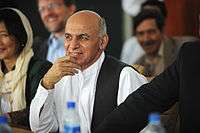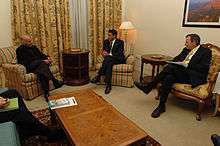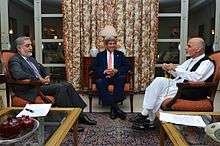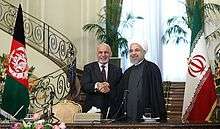Ashraf Ghani
| Ashraf Ghani اشرف غني | |
|---|---|
.jpg) Ghani in 2014 | |
| 13th President of Afghanistan | |
|
Assumed office 29 September 2014 | |
| Vice President |
Abdul Rashid Dostum Sarwar Danish |
| Chief Executive | Abdullah Abdullah |
| Preceded by | Hamid Karzai |
| Chancellor of Kabul University | |
|
In office 22 December 2004 – 21 December 2008 | |
| Preceded by | Habibullah Habib |
| Succeeded by | Hamidullah Amin |
| Minister of Finance | |
|
In office 2 June 2002 – 14 December 2004 | |
| President | Hamid Karzai |
| Preceded by | Hedayat Amin Arsala |
| Succeeded by | Anwar ul-Haq Ahady |
| Personal details | |
| Born |
Ashraf Ghani Ahmadzai 19 May 1949 Logar, Kingdom of Afghanistan |
| Nationality | Afghan[1] |
| Political party | Independent |
| Spouse(s) | Rula Ghani |
| Relations | Hashmat Ghani Ahmadzai (brother) |
| Children |
Mariam Tariq |
| Alma mater |
American University of Beirut Columbia University |
Mohammad Ashraf Ghanī Ahmadzai (Pashto/Dari: محمد اشرف غني احمدزی, born 19 May 1949) is a Afghan politician who is the current President of Afghanistan, elected on 21 September 2014. An anthropologist by education, he previously served as finance minister and the chancellor of Kabul University.
Before returning to Afghanistan in 2002, Ghani was a professor of anthropology at numerous institutions (mostly Johns Hopkins University), and later started working with the World Bank. As the Finance Minister of Afghanistan between July 2002 and December 2004, he led Afghanistan's attempted economic recovery after the collapse of the Taliban government.[2]
He is the co-founder of the Institute for State Effectiveness, an organization set up in 2005 to improve the ability of states to serve their citizens. In 2005 he gave a TED talk, in which he discussed how to rebuild a broken state such as Afghanistan.[3] He is a member of the Commission on Legal Empowerment of the Poor, an independent initiative hosted by the United Nations Development Programme. In 2013 he was ranked 50th in an online poll to name the world's top 100 intellectuals conducted by Foreign Policy magazine and second in a similar poll run by Prospect magazine.[4]
Ghani came in fourth in the 2009 presidential election, behind Hamid Karzai, Abdullah Abdullah, and Ramazan Bashardost. In the first round of the 2014 presidential election, Ghani won 32% of the vote, second to Abdullah who secured 45% of the votes cast. Both candidates went on to contest a run-off election, which was held on 14 June 2014 with Ghani winning 56.44% of the votes with a lead of one million votes over Abdullah.
Early life
Ghani was born on 19 May 1949[5] in the Logar Province of Afghanistan. He belongs to the Ahmadzai Pashtun tribe.[6][7]
As a foreign exchange student, Ashraf attended Lake Oswego High School in Lake Oswego, Oregon and graduated with the class of 1967. He initially wanted to study Law but then changed his major to Cultural Anthropology. Ghani attended the American University in Beirut where he earned his bachelor's degree in 1973, and after that, attended Columbia University where he earned his master's degree in 1977, and a PhD degree in 1983. He met his future wife, Rula, while studying there.[6]
Academic career
Following his bachelor's degree he served on the faculty of Kabul University (1973–77) and Aarhus University in Denmark (1977). Following his PhD degree, he was invited to teach at University of California, Berkeley in 1983, and then at Johns Hopkins University from 1983 to 1991. He has also attended the Harvard-INSEAD and World Bank-Stanford Graduate School of Business's leadership training program. His academic research was on state-building and social transformation. In 1985, he completed a year of fieldwork researching on Pakistani madrassas as a Fulbright Scholar.[6]
World Bank
He joined the World Bank in 1991, working on projects in East and South Asia through the mid-1990s.[6]
Political career
Returning to Afghanistan after 24 years, in December 2001, Ghani left his posts at the UN and World Bank to join the new Afghan government as the chief advisor to President Hamid Karzai on 1 February 2002.
After leaving Kabul University, Ghani co-founded the Institute for State Effectiveness[8] with Clare Lockhart, of which he was Chairman. The Institute put forward a framework proposing that the state should perform ten functions in order to serve its citizens. This framework was discussed by leaders and managers of post-conflict transitions at a meeting sponsored by the UN and World Bank in September 2005. The program proposed that double compacts between the international community, government and the population of a country could be used as a basis for organizing aid and other interventions, and that an annual sovereignty index to measure state effectiveness be compiled.
Ghani was tipped as a candidate to succeed Kofi Annan as Secretary General of the United Nations at the end of 2006[9] in a front-page report in The Financial Times that quoted him as saying, "I hope to win, through ideas." Carlos Pascual of the Brookings Institution was also quoted, praising Ghani's "tremendous intellect, talent and capacity."[10]
In 2005, Ghani gave keynote speeches for meetings including the American Bar Association's International Rule of Law Symposium, the Trans-Atlantic Policy Network, the annual meeting of the Norwegian Government's development staff, CSIS's meeting on UN reform, the UN–OECD–World Bank's meeting on Fragile States and TEDGlobal.[11] He contributed to the Financial Times, International Herald Tribune, Los Angeles Times, The New York Times, The Wall Street Journal, and The Washington Post.
Finance Minister of Afghanistan
Ghani was recognized as the best finance minister of Asia in 2003 by Emerging Markets. He carried out extensive reforms, including issuing a new currency, computerizing treasury operations, instituting a single treasury account, adopting a policy of balanced budgets and using budgets as the central policy instrument, centralizing revenue collection, tariff reform and overhauling customs. He instituted regular reporting to the cabinet, the public and international stakeholders as a tool of transparency and accountability, and required donors to focus their interventions on three sectors, improving accountability with government counterparts and preparing a development strategy that held Afghans more accountable for their own future development.
Poverty eradication through wealth creation and the establishment of citizens' rights is the heart of Ghani's development approach. The National Solidarity Program[12] covers 13,000 of the country's estimated 20,000 villages.
2009 Presidential election


In January 2009 an article by Ahmad Majidyar of the American Enterprise Institute included Ghani on a list of fifteen possible candidates in the 2009 Afghan presidential election.[13]
On May 7, 2009, Ashraf Ghani registered as a candidate in the Afghan presidential election, 2009. Ghani's campaign emphasized the importance of: a representative administration; good governance; a dynamic economy and employment opportunities for the Afghan people.[14] Unlike other major candidates, Ghani asked the Afghan diaspora to support his campaign and provide financial support.[15] He appointed Mohammed Ayub Rafiqi as one of his vice president candidate deputies, and paid for the noted Clinton campaign chief strategist James Carville as a campaign advisor.[16]
Preliminary results placed Ghani fourth in a field of 38, securing roughly 3% of the votes.[17]
Reconstruction
On 28 January 2010, Ghani attended the International Conference on Afghanistan in London, pledging his support to help rebuild their country. Ghani presented his ideas to Karzai as an example of the importance of cooperation among Afghans and with the international community, supporting Karzai's reconciliation strategy. Ghani said hearing Karzai's second inaugural address in November 2009 and his pledges to fight corruption, promote reconciliation and replace international security forces persuaded him to help.[18]
Presidency

After announcing his candidacy for the 2014 elections, Ghani tapped General Abdul Rashid Dostum, a prominent Uzbek politician and former military official in Karzai's government and Sarwar Danish, an ethnic Hazara, who also served as the Justice Minister in Karzai's cabinet, as his vice presidential candidates.[19]

.jpg)
After none of the candidates managed to win more than 50% of the vote in the first round of the election, Ghani and Abdullah Abdullah, the two front runners from the first round, contested in a run-off election, which was held on 14 June 2014.
Initial results from the run-off elections showed Ghani as the overwhelming favourite to win the elections. However, allegations of electoral fraud resulted in a stalemate, threats of violence and the formation of a parallel government by the camp of his opponent, Abdullah Abdullah. On 7 August 2014 US Secretary of State John Kerry flew to Kabul to broker a deal that outlined an extensive audit of nearly 8 million votes and formation of a national unity government with a new role for a chief executive officer who would carry out meaningful functions within the president's administration. After a three-month audit process, which was supervised by the United Nations with financial support from the U.S. government, the Independent Election Commission announced Ghani as President after Ghani agreed to a national unity deal. Initially the election commission said it would not formally announce specific results. It later released a statement that said Ghani managed to secure 55.4% and Abdullah Abdullah secured 43.5% of the vote, although it declined to release the individual vote results.
Economy and trade
During his tenure, Ghani has strengthened ties with Central Asian countries such as Uzbekistan, with which it has made deals to increase mutual trading.[20][21] New trade routes have also been launched within the wider region. The Chabahar Port in Iran allows increased trading with India whilst avoiding Pakistani territory.[22] A railway line from Khaf in Iran to Herat in Afghanistan is set to be opened in late 2018.[23][24] In 2017, a railway line from Turkmenistan was extended to Aqina in Afghanistan, the precursor of the "Lapis Lazuli" transport corridor that was signed by Ghani that same year and would link Afghanistan to the Caucasus and the Black Sea.[25] Other regional projects include the CASA-1000 hydroelectricity transmission from Central Asia, and the TAPI gas pipeline, expected to be completed by 2018 and 2019 respectively.[26] In January 2018 at the inauguration of the Khan Steel iron smelting plant in Kabul, Ghani said that he is aiming for Afghanistan to become a steel exporter.[27]
Relations with Pakistan
Since his election Ghani wanted to improve relations with Pakistan, which in turn could pave the way for peace talks with the Taliban. He made his first visit to Pakistan on November 14, 2014, meeting Prime Minister Nawaz Sharif.[28] However, after many terror attacks in Afghanistan which were largely blamed on Pakistan, and failed Taliban peace talks, Ghani grew increasingly cold to Pakistan.[29] Ghani claimed that Pakistan had hit an "undeclared war of aggression" against Afghanistan.[30] In 2016 he started a "trade war" by increasing entry taxes for Pakistani trucks, and making trade deals with India and Iran.[31] Following two deadly Taliban/Haqqani attacks in Kabul in January 2018, Ghani called Pakistan the "center of the Taliban".[32] He also refused to take a call from the Pakistani prime minister, instead sending an NDS delegation to hand over evidence that the terrorists were supported by Pakistan.[33]
Personal life
.jpg)
Ashraf Ghani is married to Rula Saade,[34] a citizen with dual Lebanese and American nationality. Rula Saade Ghani was born in a Lebanese Christian family.[35] The couple married after they met during their studies at the American University of Beirut, Lebanon during the 1970s.[36] They eventually settled in the United States and obtained U.S. citizenship. However, Ghani renounced his U.S. citizenship in 2009 so he could run in Afghan elections.[1]
Ashraf and Rula Ghani have two children, a daughter, Mariam, a Brooklyn-based visual artist,[37] and a son, Tariq. Both were born in the United States and carry U.S. citizenship and passports. In an unusual move for a politician in Afghanistan, Ghani at his presidential inauguration in 2014 publicly thanked his wife, acknowledging her with an Afghan name, Bibi Gul.[36] "I want to thank my partner, Bibi Gul, for supporting me and Afghanistan," he said. "She has always supported Afghan women and I hope she continues to do so."[38]
See also
References
- 1 2 Afghanistan’s elections: Ghani vs Abdullah, by Brieana Marticorena. The Strategist. Aug. 19, 2014.
- ↑ Irfaniffy (3 April 2017). "Ashraf Ghani The President of Afghanistan" – via blogspot.com.
- ↑ Ashraf Ghani. "Ashraf Ghani: How to rebuild a broken state - TED Talk - TED.com". ted.com. Retrieved 2 December 2015.
- ↑ "World Thinkers 2013 – Prospect Magazine". prospectmagazine.co.uk. Retrieved 2 December 2015.
- ↑ "Ashraf Ghani Ahmadzai". Twitter. Retrieved February 13, 2016.
- 1 2 3 4 "Ashraf Ghani". Encyclopædia Britannica. Retrieved December 4, 2015.
- ↑ "Ashraf Ghani Ahmadzai". Dawn. Retrieved December 4, 2015.
- ↑ "Institute for State Effectiveness". Institute for State Effectiveness. Retrieved 2 December 2015.
- ↑ "Sekretarz generalny ONZ. Wybory 2006". Unic.un.org.pl. Retrieved 2013-03-29.
- ↑ "Ghani joins race to succeed Annan". Financial Times. Retrieved 12 November 2014.
- ↑ "Ted Global – Day 1". The TrueTalk Blog. Archived from the original on 2015-10-04. Retrieved 2 December 2015.
- ↑ "National Solidarity Program". Archived from the original on 2007-09-29. Retrieved 2006-09-14.
- ↑ Ahmad Majidyar (January 2009). "Afghanistan's Presidential Election". American Enterprise Institute. Archived from the original on 2009-09-18.
A world-renowned economist, Ahmadzai was a key figure in the formation of the post-Taliban government in Afghanistan. The chairman of the Institute for State Effectiveness, he served as an adviser to the United Nations for the formation of the Bonn Agreement and as finance minister of Afghanistan from 2002 to 2004. His recent harsh criticism of Karzai’s government has prompted speculation that he may run for president. An ethnic Pashtun, Ahmadzai has not officially announced his candidacy.
- ↑ "Ashraf Ghani for President » Ashraf Ghani's registration for the 2009 Presidential Elections". Ashrafghani.af. Retrieved 2013-03-29.
- ↑ "Ashraf Ghani for President". Campaigncontribution.com. Retrieved 2013-03-29.
- ↑ "James Carville Joins The Afghan Campaign Trail". NPR. 29 July 2009. Retrieved 2013-03-29.
- ↑ "Preliminary Result of Afghanistan Presidential Contest". Sabawoon online. 2009-08-20. Archived from the original on 2009-08-03.
- ↑ "Ghani Pledges to Back Karzai in Rebuilding Effort" Archived 2012-02-29 at the Wayback Machine.
- ↑ "Kick Out Karzai We Deserve a Second Chance". NPR. 20 August 2009. Archived from the original on 31 May 2011. Retrieved 2013-03-29.
- ↑ Diplomat, Catherine Putz, The. "Ghani and Mirziyoyev Meet, Renew Afghan-Uzbek Ties".
- ↑ akbaryusupov. "Uzbekistan, Afghanistan readying agreement on trade and cooperation in transit of goods".
- ↑ "India & Kabul play new round in Great Game: Chabahar". 31 October 2017.
- ↑ "Route of the Khaf – Herat railway - Railways of Afghanistan". www.andrewgrantham.co.uk.
- ↑ "Khaf-Herat railroad to be launched in Iran soon".
"Iran-Afghanistan railway networks through Khaf-Herat Railroad will be completed in the next few months," Yazdani said, according to Mehr news agency on August 3
- ↑ "Afghanistan, Turkmenistan, Azerbaijan, Georgia, Turkey create transport corridor". 26 November 2017.
- ↑ Rubin, Barnett (30 December 2015). "The TAPI Pipeline and Paths to Peace in Afghanistan" – via www.newyorker.com.
- ↑ "Our Goal Is To Turn Afghanistan Into A Steel Exporter". TOLOnews.
- ↑ Islamabad, Agence France-Presse in (14 November 2014). "Afghan president Ashraf Ghani arrives in Islamabad to build Pakistan ties". the Guardian.
- ↑ "Ghani and Pakistan". www.thenews.com.pk.
- ↑ "Ghani Says Afghanistan Hit by 'Undeclared War' From Pakistan". 6 June 2017 – via www.bloomberg.com.
- ↑ "Ashraf Ghani's Trade War against Pakistan favors India and Iran – Afghan Studies Center". afghanstudiescenter.org.
- ↑ "Pakistan Is The Center Of Taliban, Ghani Tells The Nation". TOLOnews.
- ↑ "Afghan President speaks to Modi, not to Pakistan PM". 16 April 2018 – via The Economic Times.
- ↑ Tanya Goudsouzian. "Afghan first lady in shadow of 1920s queen?". aljazeera.com. Archived from the original on 6 October 2014. Retrieved 2 December 2015.
- ↑ "Al Arabiya: Afghanistan's next first lady, a Christian Lebanese-American?". alarabiya.net. Retrieved 2 December 2015.
- 1 2 "Ashraf Ghani inaugurated: Is Afghanistan ready for a high-profile first lady?". Telegraph.co.uk. 29 September 2014. Retrieved 2 December 2015.
- ↑ Walsh, Declan; Nordland, Rod (14 October 2014). "Jolting Some, Afghan Leader Brings Wife Into the Picture" – via NYTimes.com.
- ↑ Nathan Hodge and Margherita Stancati (29 September 2014). "Ghani Sworn In as Afghan President". WSJ. Retrieved 2 December 2015.
External links
| Wikiquote has quotations related to: Ashraf Ghani |
| Wikimedia Commons has media related to Ashraf Ghani Ahmadzai. |
- Islamic Republic of Afghanistan: Office of the President
- Profile: Ashraf Ghani – BBC News
- Afghan Elections Dossier – Ashraf Ghani, August 2009 – Radio France Internationale
- Ashraf Ghani at TED

- AFGHANISTAN’S THEORIST-IN-CHIEF; President Ashraf Ghani is an expert on failed states. Can he save his country from collapse? 4 July 2016 The New Yorker issue by George Packer
- BBC Radio 4 Profile
- Appearances on C-SPAN
| Political offices | ||
|---|---|---|
| Preceded by Hedayat Amin Arsala |
Minister of Finance 2002–2004 |
Succeeded by Anwar ul-Haq Ahady |
| Preceded by Hamid Karzai |
President of Afghanistan 2014–present |
Incumbent |